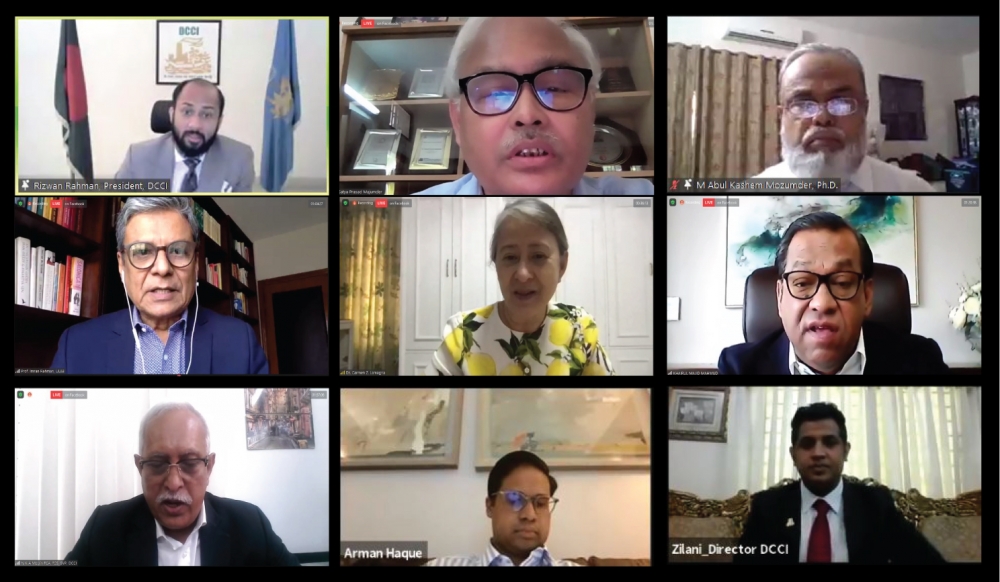News
Webinar on Industry and Academia Linkage: Role of Academia

Due to technological advancement and industrial transformation, automation will axe many occupations with low-skilled, repetitive jobs but on the other hand, to remain competitive globally we need to identify the skills gap and readiness, said Rizwan Rahman, President of Dhaka Chamber of Commerce & Industry (DCCI) in a webinar on “Industry and Academia Linkage: Role of Academia” held today on April 24, 2021.
DCCI President Rizwan Rahman also said that Bangladesh is blessed with a demographic dividend of 44 million working age people but graduates are struggling in the job market as our conventional education system lacks skill-orientation in line with the industry demands. Consequently, foreigners dominate in the technical, managerial positions of our key industries and corporate firms leading to substantial remittance outflow from Bangladesh. The Global Innovation Index 2020 ranked Bangladesh 116th of 131 economies in innovation indicator while, India 48th and Nepal, Pakistan and Sri Lanka were ahead of us. University-industry collaboration has emerged as a means to elevate the country competitiveness in terms of developing able human resources and innovation ecosystem. Universities can integrate industry-related contents in the undergraduate programmes to orient on industrial state to make them ready for meeting industrial challenges. He also suggested for updating the University curriculum incorporating the best practices followed in best Western and regional universities. And for that Collective initiative of UGC and University is needed. He also underscored the importance of research based universities with a special focus to science, technology, engineering and math.
Prof. Satya Prasad Majumder, Vice Chancellor, BUET, M Abul Kashem Mozumder, Ph.D., Pro-Vice Chancellor, Bangladesh University of Professionals, Dr. Carmen Z Lamagna, Vice Chancellor, American International University of Bangladesh and Prof. Imran Rahman, Special Advisor (Board of Trustees) & Dean, University of Liberal Arts Bangladesh joined as special discussants.
Prof. Satya Prasad Majumder, Vice Chancellor, BUET said industry-academia collaboration in the USA, Europe and South Korea can be the example for us. Moreover, we need to adopt short and long term planning. For technological innovation, research and necessary funding for it are must, he said. He called upon both the government and private sector to come up with adequate funding for research and innovation. He also underscored the importance of redesigning the curriculum emphasizing on technology, innovation, business incubation, startups and entrepreneurship development. He also said that industry representation in the academic council and advisory board of universities will minimize the gap between industry and academia.
M Abul Kashem Mozumder, Ph.D., Pro-Vice Chancellor, Bangladesh University of Professionals said that students need training and facilities to do research. Universities mainly focus on teaching, research and entrepreneurship development. He emphasized on representation of industries in the university governing body, syndicate and senate. For research and development he said there is a lack of necessary funding but to get adequate funding, government should give tax benefits to this precious investment.
Dr. Carmen Z Lamagna, Vice Chancellor, American International University of Bangladesh said unemployment rate is 4.37% in Bangladesh. She said that the industry and academia gap constitutes of curriculum mismatch with the industry standard, lack of working environment for interns, academics without industry exposure etc. She also urged on research and advanced training. Government can arrange financial incentives, policy regulations, guidance and support and infrastructure development to foster industry-academia collaboration, she added.
Prof. Imran Rahman, Special Advisor (Board of Trustees) & Dean, University of Liberal Arts Bangladesh said linkage between industry and academia needs joint initiative. Universities should modernize the teaching method. There are three aspects of education that are teaching, research and career placement. But as a whole we need to redesign our curriculum in line with the demand of 4th industrial revolution and market demand. Most important thing is research & innovation and for that, industry can join hands to inject necessary fund for research considering it as an investment, he added.
Published on: 2021-04-24
